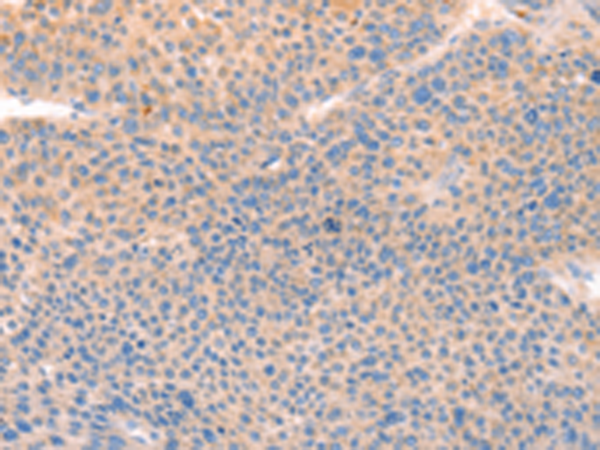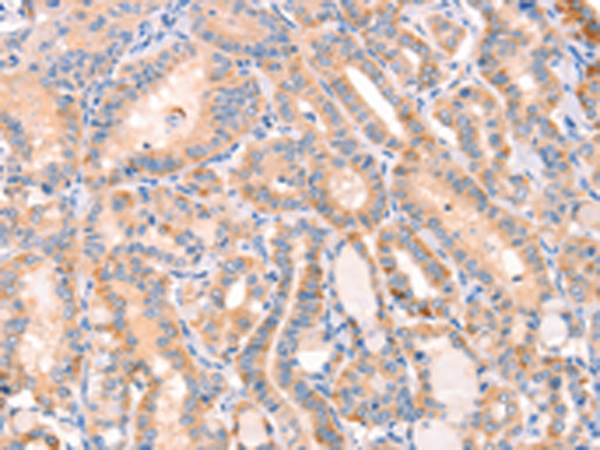

| WB | 咨询技术 | Human,Mouse,Rat |
| IF | 咨询技术 | Human,Mouse,Rat |
| IHC | 1/25-1/100 | Human,Mouse,Rat |
| ICC | 技术咨询 | Human,Mouse,Rat |
| FCM | 咨询技术 | Human,Mouse,Rat |
| Elisa | 1/2000-1/5000 | Human,Mouse,Rat |
| Aliases | CPAMD7; RP11-525G3.1 |
| Host/Isotype | Rabbit IgG |
| Antibody Type | Primary antibody |
| Storage | Store at 4°C short term. Aliquot and store at -20°C long term. Avoid freeze/thaw cycles. |
| Species Reactivity | Human |
| Immunogen | Synthetic peptide of human CD109 |
| Formulation | Purified antibody in PBS with 0.05% sodium azide and 50% glycerol. |
+ +
以下是关于CD109抗体的3篇代表性文献的简要信息(基于公开摘要内容整理):
1. **文献名称**:CD109 regulates tumor-initiating capacity and chemoresistance in head and neck squamous cell carcinoma
**作者**:Sato T, et al.
**摘要**:研究揭示了CD109作为头颈鳞状细胞癌(HNSCC)肿瘤干细胞标记物的作用,通过抗体阻断实验证明其高表达与化疗耐药性相关,并参与TGF-β/Smad信号通路调控。
2. **文献名称**:CD109 controls TGF-β1 potency and modulates endothelial to mesenchymal transition in systemic sclerosis
**作者**:Finnson KW, et al.
**摘要**:该研究利用CD109抗体探究其在系统性硬化症中的作用,发现CD109通过拮抗TGF-β1信号通路抑制内皮-间质转化(EndMT),提示其作为纤维化疾病治疗靶点的潜力。
3. **文献名称**:CD109 promotes glioblastoma cell proliferation and invasion through integrin-mediated signaling
**作者**:Zhang Y, et al.
**摘要**:研究通过抗体验证CD109在胶质母细胞瘤中的高表达,证明其通过整合素-FAK信号通路促进肿瘤细胞增殖和侵袭,可能成为神经胶质瘤的治疗靶标。
如需获取全文,建议通过PubMed、ResearchGate或联系作者获取合法访问途径。
CD109 is a glycosylphosphatidylinositol (GPI)-anchored cell surface glycoprotein belonging to the complement regulatory protein family, also recognized as a TGF-β co-receptor. Initially identified in activated T-cells and platelets, it is broadly expressed in endothelial cells, immune cells, and certain epithelial tissues. CD109 plays multifaceted roles in regulating TGF-β signaling, cell adhesion, and immune responses. Its dual function includes both enhancing and suppressing TGF-β activity depending on cellular context, impacting processes like angiogenesis, fibrosis, and tumor progression. Dysregulated CD109 expression is implicated in cancers (e.g., squamous cell carcinoma, glioblastoma), inflammatory disorders, and psoriasis, often correlating with disease aggressiveness or poor prognosis.
CD109 antibodies are essential tools for studying its biological functions and clinical relevance. They enable detection of CD109 expression in tissues or cells via techniques like flow cytometry, immunohistochemistry, and Western blot. Specific antibody clones (e.g., TEA 2/16. H-130) target distinct epitopes, aiding in functional studies such as ligand-receptor interaction analysis or TGF-β pathway modulation. Recent research highlights CD109 antibodies in therapeutic exploration, including antibody-drug conjugates or immune checkpoint targeting. However, challenges remain in standardizing assays due to CD109's complex post-translational modifications and variable shedding from cell membranes. Ongoing studies aim to clarify its context-dependent roles and validate its utility as a diagnostic/prognostic biomarker or therapeutic target.
×